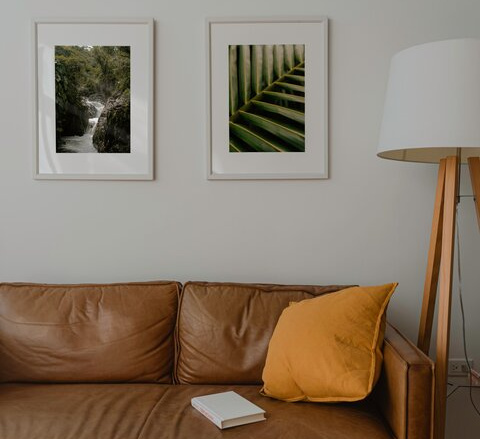
My first place was a two-bedroom apartment with a little porch that overlooked the lush green of Richmond, Virginia. I was a single mom of a curious two-year-old, so an apartment on the third floor added an extra layer of complication to my coming and going, but I preferred the inconvenience over the sound of neighbors above me. The washer and dryer were in the kitchen, which I didn’t mind because it gave me extra counter space, and my bedroom was in direct view of the front door. I quickly developed the habit of making my bed.
After tucking my daughter in one of those first nights, I cozied into the second-hand love seat and surveyed my eight hundred square feet of independence. My furniture was an amalgamation of thrift store pieces and gifts from church people—a velour love seat the color of honey, four chairs with wicker backs and a dinner table, a black and white TV, and a chair in the corner with a too-deep seat and no armrests. A side table with screw-in legs was the only brand-new piece, a ten-dollar find from Walmart that I’d decorated with mirrored tiles to give it some charm. Pictures were hung, thanks to the hammer and nails Grandpa had packed for me—because “no woman should live on her own without a toolbox.”
My little place was heaven. I was completely satisfied with all it was and all it wasn’t, and there in the quiet, I whispered, “I hope I never want more than this.”
I was twenty years old, raising my little girl on my own, with no support of any kind from the father. The budget was tight. Paper towels were a luxury, the first thing off the grocery list if money ran out. My Geo Storm in the parking lot was paid off but wasn’t guaranteed to last long. I was actively hoping for more one day. I hoped for a husband, more children, a house of our own, and a vehicle with more than two doors. I hoped for time at home as a mom rather than full days at work.
I had hopes for my future, but in that moment, I didn’t want more. I had enough. I hoped to preserve that sensation and enjoy what came without ever wanting for more.
A husband came first. He came with things and furniture, and the little love seat went to someone else. A new baby came, then more time at home. We bought a house with more space and a used car with four doors. More babies, more things, more obligations. Life got big, not because of a feverish want for more, but because more is the privilege of growing older. Time adds years, knowledge, experience, and relationships.
But time also adds loss and grief, complexity and challenge. This week, in particular, I want less—less problems, less conflict, less worry, less noise. Working with women in crisis and abuse, I want fewer stories of trauma and injustice. Visiting my friend in the psychiatric hospital, I want less struggle for healing. Listening to my kids’ process their world, I want less harmful distraction vying for their attention—for their souls. Can I be satisfied with all that comes to me, even when I don’t want it? It seems impossible.
In my frustration, I’ve reminisced about that apartment and the seemingly smaller problems of my twenty-year-old self. I’m tempted to believe the bigness is to blame, that big and simple are opposites and if I sell all the things and buy a hut somewhere (preferably on a beach far away), hardship and trouble will disappear. Simplicity will return. I’m tempted to believe this want for less is somehow justified, holier than the want for more.
But wanting less is dissatisfaction, just the same as wanting more. It looks different, but it is equally troublesome. Want is never simple.
In morning prayer, I watch the sunrise. Truth from my childhood comes to mind. “The Lord is my Shepherd, I shall not want.” In my apartment with the thin budget—“I have everything I need.” In my house with the big kids, the challenges, the heavy world that make me feel ill-equipped—“I lack nothing.” Whether life is big or small, less or more, the choice of being satisfied is mine to make. God gives enough. Contentment comes from accepting what He gives. That is simplicity.
- The Lens of Wisdom - November 30, 2021
- Complication and Contentment - May 26, 2021
Love this – so refreshingly unique on the subject of “want”. Great thoughts.
“But wanting less is dissatisfaction, just the same as wanting more. It looks different, but it is equally troublesome. Want is never simple.” Those are some profound words. I have seen people who glory in their “less” mentality and those who glory in their “more”. In my “older” age I have decided it is when you are satisfied with where you are, who you are, and what you have, and especially do not feel the need to disparage others for their choices, can rejoice with one who has a lot and one who has little, then peace reigns.
I love this sharing of your discovery of ‘want’. I will be chewing on this for days!
Carole
Michelle, thanks for the reminder to live where I am in contentment. It helps me to see the value in my life now and to be grateful always.